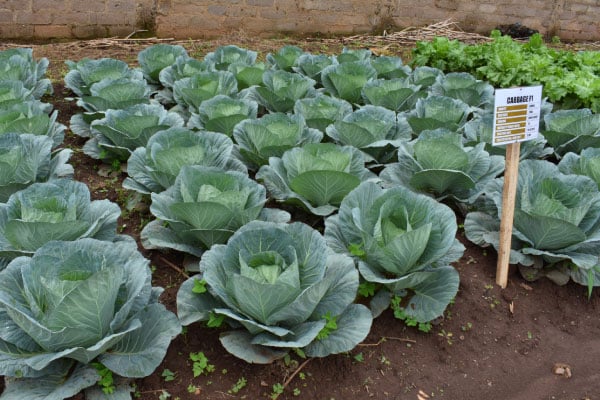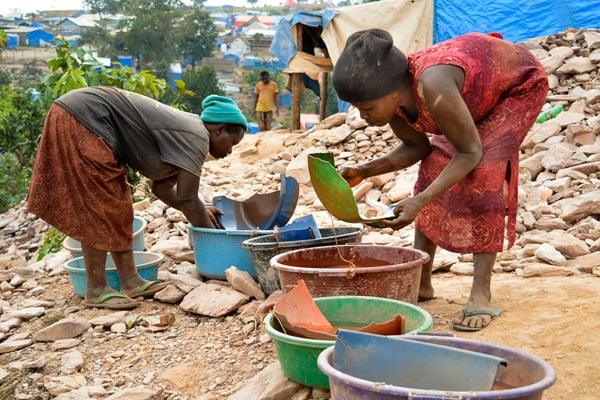Buikwe farmers busk in rich harvests

What you need to know:
- To enhance farmers' capabilities, a cooperative provides training on modern farming practices, such as line planting and post-harvest handling, while also facilitating market linkages.
Before 2017, Margaret Kibalama was struggling to make ends meet after the loss of her husband. She lived in a small house and had difficulty providing for her family of eight children.
A turning point came in November 2017 when five women gathered to discuss poverty reduction, household food security, and improved livelihoods. These pioneering women mobilised a group of 20 people, including 15 women, to form Kiseda Zibulatudde Farmers Association. They began with community farming but quickly realised a need for training in best agronomic practices.
During this time, World Vision, a Christian organisation dedicated to combating poverty through advocacy, development, and relief efforts, intervened. Their trainers advised the community to form a Village Savings and Loans Association (VSLA) to address their financial needs.
A VSLA is a village-based financial system that provides the productive poor, primarily in rural areas, with the opportunity to invest in shares and lend money to each other at agreed-upon interest rates, operating on a group basis.
"Thanks to the VSLA, we've had the opportunity to borrow money for income-generating activities. This has made a significant difference in our lives, particularly when it comes to our children's education," she says.
Kibalama explains that they began by saving Shs1,200 each every week. The VSLA operates in yearly cycles, during which accumulated savings and loan profits are distributed among members based on their individual contributions. This aligns with the cultural practice of saving for future needs, which the VSLA reinforces.
The group's savings are used to provide loans to members, with repayments made on a regular schedule. Through the VSLA, many women have started new businesses, expanded existing ones, or purchased food during harvest seasons to sell at a profit during lean periods.
With the support of the VSLA, many beneficiaries have engaged in small-scale trading, selling items like tomatoes, avocados, liquid soap, handicrafts, and food products. It is well-known that women are excellent household managers and caregivers, especially for children's wellbeing.
"I lived in poverty for a long time, but loans from the VSLA have transformed my life. I've been able to send my children to school and build a new home. Three of my children have already graduated and life is good," Kibalama says.
After accumulating sufficient savings, the group ventured into poultry farming, banana cultivation and vegetable production. Their poultry stock now includes kuroilers, broilers, layers and local breeds.
The association is composed of eight farming groups, three of which have received chicken.
World Vision played a crucial role in educating the community about involving children in economic activities as a sustainable approach. The children have their own savings scheme and actively participate in farming alongside their parents. The group currently has 40 children, including 22 girls.
In 2017, each family received an avocado seedling to promote better nutrition in addition to their vegetable farming efforts.
"As members, we support each other's efforts to ensure food security for our families. We hold each other accountable," she says.
Kibalama is one of the many people who have benefited from the Ngogwe Area Programme, a transformative initiative launched in the region in 2007.
Impactful intervention
World Vision Uganda is a humanitarian organisation operating in 43 districts across Uganda, implementing programmes in various sectors. Since its establishment in 2007, the Ngogwe area programme has played a crucial role in improving the lives of thousands of individuals and families in Ngogwe Sub-county, Buikwe District.
The programme, supported by World Vision New Zealand, served a population of 35,524 people across six parishes and 73 villages. The programme's goal was to enhance the quality of life in the community through participatory, sustainable development practices.
The organisation was initially drawn to Buikwe in 2007 due to the alarming prevalence of child sacrifices in the area. Reports indicated that at least one child was killed each week in Buikwe. Superstition and poverty created a market where witch-doctors, particularly those from Ngogwe, convinced some people that blood and body parts from children could bring wealth, cure diseases, and ward off evil spirits. The first documented child sacrifice in Buikwe occurred in 1998, and subsequently, such incidents became more common.
World Vision's initial intervention focused on improving literacy, raising HIV/Aids awareness, and addressing the root causes of child sacrifice.
The Ngogwe area programme spanned across six parishes, encompassing 73 villages and serving a total population of 35,524 individuals, including 17,830 females. The overarching goal was to enhance the quality of life for people in Ngogwe Sub-county through participatory, community-based sustainable development practices by 2023.
The programme contributed to several sustainable development goals, including zero hunger, no poverty, good health, quality education, reduced inequality, and peace, justice, and strong institutions.
John Yugo Ofwono, the programme manager for Buikwe, noted a significant shift in the community following the $4m investment over the 17 years.
The Ngogwe area programme provided valuable livelihood services to local farmers. Women were organised into farmer groups, while individual farmers were encouraged to establish kitchen and school gardens.
The programme connected farmers with quality seed suppliers to enhance food security and improve family income. There is a clear emphasis on crop diversification and animal husbandry.
James Kaahwa, the programmes of Director of World Vision Uganda, stated that the programme had fully achieved its objectives.
"Our 17-year journey has been one of community empowerment and mindset change," Kaahwa says. "We've addressed the deep-rooted issues of poverty and illiteracy, and are proud to leave behind a community that is stronger and more resilient."
Resilience
Julius Sempeebwa, the business operations manager of the Ngogwe Area Cooperative, says they have been empowered in agricultural innovation. The cooperative, boasting a membership of 400, houses the Local Seed Business Umbrella and the Farmers Integrated Enterprise Development Association.
This farmer-led seed enterprise produces high-quality seeds and distributes them to local farmers. Despite the low adoption rates of improved seeds nationwide, the cooperative's initiative offers a viable solution. According to the 2018 National Seed Policy, only 15 percent of seeds and planting materials used by Ugandan farmers originate from the formal seed supply system.
Commercial seed companies often prioritise high-value hybrid varieties with high replacement rates, neglecting essential food security crops like legumes, oilseeds, small cereals, and vegetatively propagated crops. The Ngogwe area cooperative's alternative seed delivery system is a beacon of hope for subsistence farmers in Buikwe District.
Quality declared seed bridges the gap between community-based seed availability and the formal seed sector. Sempeebwa emphasises the cooperative’s commitment to quality, implementing rigorous procedures like site selection, isolation distance, seed agronomy, and off-type identification.
To enhance farmers' capabilities, the cooperative provides training on modern farming practices, such as line planting and post-harvest handling, while also facilitating market linkages.
Sempeebwa highlights a common misconception among farmers: "In the past, we didn't realise that only 25kg of seed were needed to plant an acre. We often used excessive amounts without considering the cost."
Founded in 2018 with 60 members, the cooperative collaborates with Uganda Prisons and the National Crops Resources Research Institute in Namulonge to source foundation seeds. To support its members, the cooperative offers subsidies. For example, during the last season, members purchased beans at a discounted rate of Shs7,000 per kilogramme, while non-members paid Shs8,000.
We've gained the skills and resources to operate our businesses, including our local seed business, in a sustainable way," Sempeebwa says.



